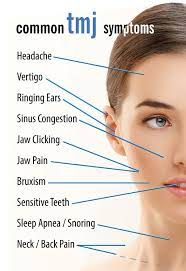Have you ever found yourself waking up with a sore jaw? Maybe you’ve noticed a clicking or popping sound when you chew, or even a headache that won’t go away no matter how much water or coffee you drink? It might be more than just stress. You could be dealing with something called TMJ dysfunction—and chiropractic care may be the solution you didn’t know you needed.
So, What Exactly Is TMJ Dysfunction?
TMJ stands for temporomandibular joint—the hinge that connects your jawbone to your skull. It allows you to talk, chew, yawn, and express yourself. But when this joint becomes misaligned or inflamed, it can cause a range of uncomfortable and often disruptive symptoms, known collectively as TMJ dysfunction.
This isn’t just a jaw issue—it can affect your neck, head, shoulders, and even your posture.B

Could You Be Suffering from TMJ Dysfunction?
TMJ issues can sneak up subtly or hit hard overnight. Ask yourself:

Do you grind or clench your teeth (especially at night)?
Does your jaw click, pop, or lock when you open your mouth?
Do you experience earaches, headaches, or a feeling of fullness in the ears?
Do you feel tension in your jaw, face, neck, or shoulders?
Is chewing becoming uncomfortable or even painful?
If any of these sound familiar, it’s worth investigating further.
Who Is Most at Risk?
While anyone can experience TMJ dysfunction, it’s especially common among:
People under high stress (hello, teeth clenching!)
Individuals with poor posture, especially from long hours on screens
Those who’ve experienced jaw, head, or neck trauma
People with arthritis or hypermobility
Women between 20–40 years (though it can affect anyone at any age)
How TMJ Dysfunction Can Disrupt Your Life
TMJ dysfunction doesn’t just cause jaw pain—it can affect your entire quality of life:
Disturbed sleep due to clenching or grinding
Difficulty chewing your favourite foods
Anxiety from unexplained headaches or facial tension
Frustration from not knowing where the pain is coming from
It’s the kind of issue that can slowly chip away at your day-to-day wellbeing. But here’s the good news: you don’t have to live with it.
How Can Chiropractic Care Help?
As chiropractors, we don’t just focus on backs—we look at how your whole body works together. TMJ dysfunction is often linked to misalignments in the neck, jaw, or even your upper back and shoulders.
Here’s what we assess and address during a TMJ-focused chiropractic visit:
Jaw alignment: Is the joint moving evenly? Is it restricted or locking?
Neck and upper back alignment: The position of your spine can impact jaw function.
Muscle tension: We check the muscles surrounding your jaw, neck, and shoulders for tightness or spasm.
Bite mechanics: How your teeth fit together can play a role.
Stress patterns: Clenching or grinding is often subconscious and connected to stress.
Through gentle, targeted adjustments, soft tissue techniques, and sometimes cranial work, we help to restore proper motion, reduce inflammation, and release tension—so your body can start healing.
Lifestyle Factors You May Not Have Considered
Many TMJ issues are rooted in how we live our daily lives. Here are some common contributors:
Poor posture at your desk or phone
Chewing gum excessively
Eating too many hard or chewy foods
High-stress levels leading to bruxism (teeth grinding)
Sleeping on your stomach or with poor head support

At-Home Tips to Support Healing
While chiropractic care is foundational, there are steps you can take at home to support your jaw’s recovery:
Use heat or cold packs to reduce inflammation and relax tight muscles
Avoid hard or chewy foods for a period to reduce strain
Practice awareness techniques to stop clenching during the day
Try gentle jaw stretches and movements—we can guide you on these
Improve your sleep posture with a supportive pillow and avoid stomach sleeping
Still Wondering If It’s TMJ? Let’s Find Out Together
Jaw pain can be frustrating and mysterious—but it doesn’t have to be. If you’ve been chalking it up to stress, it might be time to dig deeper.
Imagine waking up without jaw tension. Enjoying a meal without discomfort. Sleeping soundly without grinding.
At our clinic, we take a holistic and gentle approach to diagnosing and treating TMJ dysfunction. You don’t have to figure it out alone—and you don’t have to live with it.
Curious if we can help? Let’s chat. Book your appointment today and take the first step toward lasting relief.

